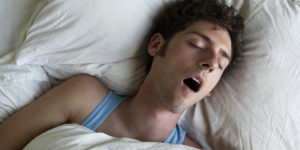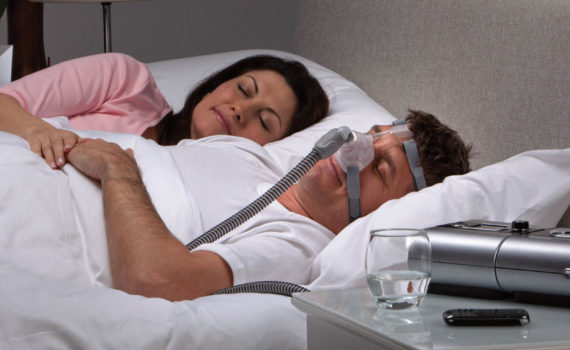What is Sleep Apnea?
Sleep apnea is a condition that makes you stop breathing for short periods while you are asleep. There are 2 types of apnea. One is called “obstructive apnea,” and the other is called “central apnea.”
In obstructive sleep apnea, you stop breathing because your throat narrows or closes. In central sleep apnea, you stop breathing because your brain does not send the right signals to your muscles to make you breathe. When people talk about sleep apnea, they are usually referring to obstructive apnea.
Sleep apnea occurs when you regularly stop breathing for 10 seconds or longer during sleep. It can be mild, moderate, or severe based on the number of times an hour that you stop breathing (apnea) or that airflow to your lungs is reduced (hypopnea). This is called the apnea-hypopnea index (AHI).
What are the Symptoms of Sleep Apnea? OSA

People with OSA do not know that they stop breathing when they are asleep. But they do sometimes wake up startled or gasping for breath. They also often hear from loved ones that they snore.
The main symptoms of sleep apnea are loud snoring, tiredness, and daytime sleepiness. Other symptoms can include:
●Restless sleep.
●Waking up choking or gasping.
●Morning headaches, dry mouth, or sore throat.
●Waking up often to urinate.
●Waking up feeling unrested or groggy.
●Trouble thinking clearly or remembering things.
Is there a Test for Sleep Apnea?
Yes. If your doctor suspects you have sleep apnea, he or she might send you for a “sleep study.” Sleep studies can sometimes be done at home, but they are usually done in a sleep lab. For the study, you spend the night in the lab, and you are hooked up to different machines that monitor your heart rate, breathing, and other body functions. The results of the test will tell your doctor or nurse if you have the disorder… read more about sleep testing
How can you Stop Sleep Apnea?
Here are some things that might help:
●Stay off your back when sleeping. (This is not always practical, because people cannot control their position while asleep. Moreover, it only helps some people.)
●Lose weight, if you are overweight.
●Avoid alcohol, because it can make sleep apnea worse.
Exercise regularly.
Avoid caffeine and heavy meals within two hours of going to bed.
Maintain regular sleep hours.
How is Sleep Apnea Treated?
As mentioned above, weight loss can help if you are overweight or obese. Nevertheless, losing weight can be challenging, and it takes time to lose enough weight to help with your sleep apnea. Most people need other treatment while they work on losing weight.
The most effective treatment for sleep apnea is a device that keeps your airway open while you sleep. Treatment with this device is called “continuous positive airway pressure,” or CPAP. People getting CPAP wear a facemask at night that keeps them breathing.
If your doctor recommends a CPAP machine, try to be patient about using it. The mask might seem uncomfortable to wear at first, and the machine might seem noisy, but using the machine can really pay off. People with sleep apnea who use a CPAP machine feel more rested and generally feel better.
There is also another device that you wear in your mouth called an “oral appliance” or “mandibular advancement device.” It also helps keep your airway open while you sleep. However, devices do not work as well as CPAP for treating sleep apnea.
In rare cases, when nothing else helps, doctors recommend surgery to keep the airway open. Surgery to do this is not always effective, and even when it is, the problem can come back.

Can Sleep Apnea Kill you?
This disruption in breathing can last for 10-60 seconds, and it can happen as many as 80 times per hour. At best, the sleeping disorder can result in poor sleep quality, headaches, and daytime fatigue, but at worst; it can kill you by increasing your risk of high blood pressure, heart disease, diabetes, and strokes.
Specifically, 1.81 percent of people with no sleep apnea died over the study period, 2.18 percent of people with mild sleep apnea died, 3.54 percent of people with moderate sleep apnea died and 4.2 percent of people with severe sleep apnea died. Heart disease and strokes were the cause of about a third of the deaths.
Can Removing Tonsils Cure Sleep Apnea?
Your doctor may suggest some surgeries to treat sleep apnea if you have swollen tonsils and adenoids that block your airway during sleep. This is often the first treatment choice for children. That’s because swollen tonsils and adenoids are often the cause of their sleep apnea.